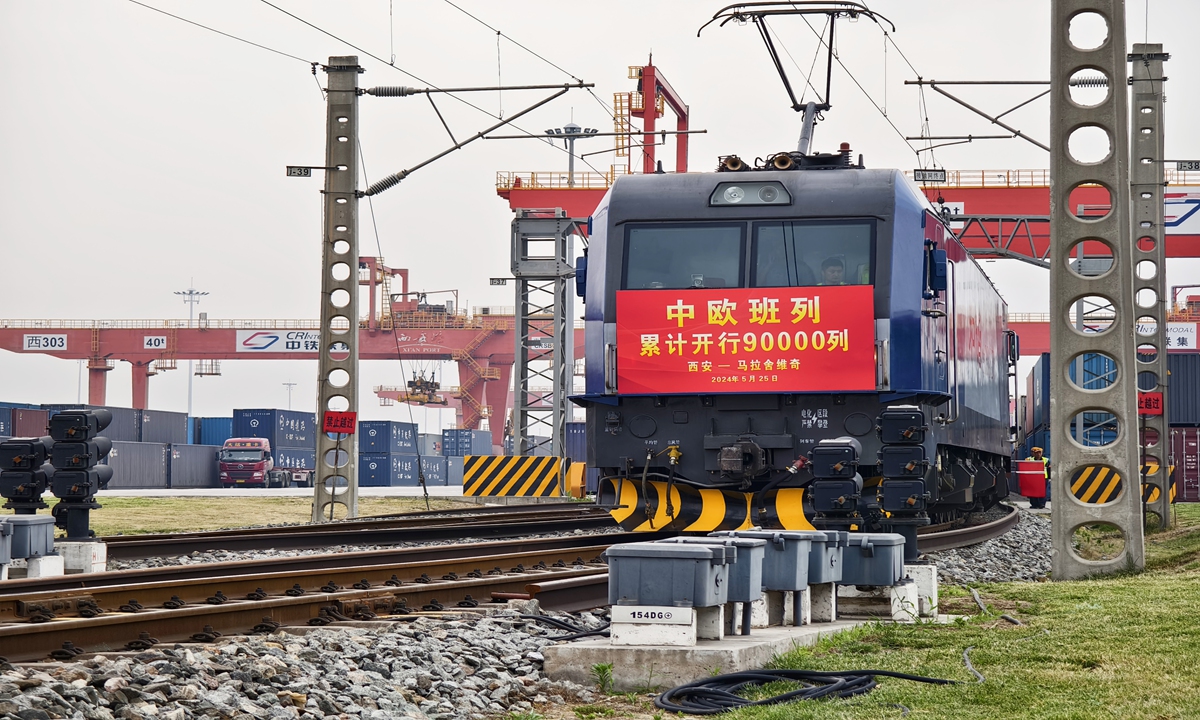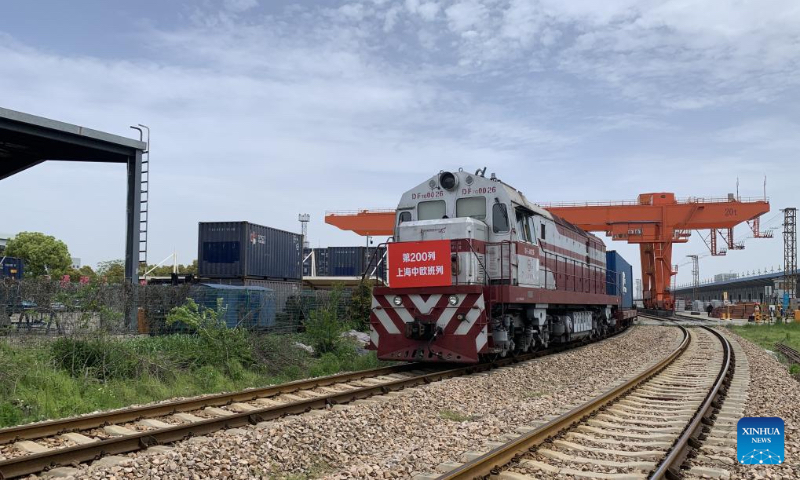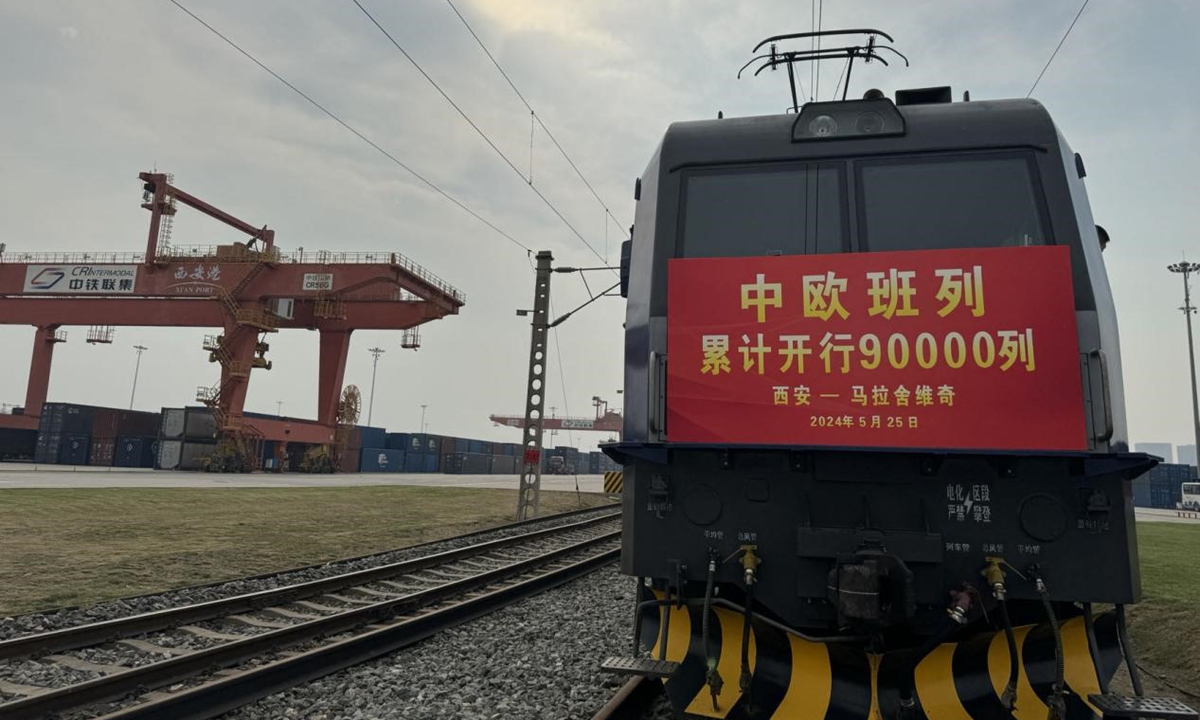China-Europe freight train runs surpass 90,000 now, as bilateral trade flourishes
Win-win trade relationship to benefit both peoples greatly: experts

The departure of X8157 train from Xi'an International Port Station Photo: Liu Yang/GT
At 8:40 am on Saturday, with the departure of the X8157 train from Xi'an International Port Station, Northwest China's Shaanxi Province to Poland's Malaszewicze, the cumulative number of China-Europe Railway Express train runs exceeded 90,000.
More than 8.7 million 20-foot equivalent units (TEUs) of cargo valued at more than $380 billion were shipped.
Experts said the figures showed that China-EU economic ties are always on fast-track growth, despite the "decoupling" calls by the US.
The rapid rise in the number of China-Europe freight train runs and the quick normalization of the service's operation after the pandemic demonstrate the mutually beneficial trade relationship between China and Europe, the experts said.
The cargo rail express, serving as a safe channel to maintain stability of global supply chains, will also inject new impetus into the high-quality development of the China-proposed Belt and Road Initiative (BRI).
"The 90,000th train was loaded with LCD monitors, clothing, shoes and hats, as well as auto spare parts," Shao Bo'er, general manager of Xi'an International Inland Port Multinational Transportation Co, told the Global Times on Saturday.
According to China State Railway Group, the time required to operate 10,000 train runs has been shortened from original 90 months at the beginning phase of the service to only seven months now. Meanwhile, more commodities are flowing between Asia and Europe via the China-Europe freight trains.
From 2016 to 2023, the annual number of China-Europe freight train runs rose from 1,702 to more than 17,000, surging nearly 10 times with annual growth rate of 39.5 percent.
The goods being shipped have expanded from laptops and printers at the beginning to more than 50,000 different types, including clothing and footwear, automobiles and parts, daily necessities, food, timber, furniture, chemicals and machinery.
"The freight train runs have become an important engine to boost economic development of both China and Europe, which is also a demonstration of economic win-win," Gong Jiong, a professor at the University of International Business and Economics, told the Global Times on Sunday.
The train runs allow more made-in-China goods, such as electronic products, household appliances and new-energy vehicles, to reach European consumers at a faster speed and with lower prices, which is in the interests of EU consumers. It also opens up a new trade channel for European manufacturers to enter the huge Chinese market, Gong said.
"With the support of the BRI, our company is growing very fast. In just two years, the company now operates 70 train runs per month, totaling more than 5,000 containers," said Nursuru Zholbaskanova, CEO of Russian logistics company SMARTLOG.
After the first China-Central Asia Summit was held in Xi'an last year, China and the Central Asian countries have been eyeing closer trade ties, Zholbaskanova told the Global Times.
Shaanxi Konka Intelligent Home Appliances Co, as the only intelligent kitchen appliance production base of the Konka Group in Northwest China, has received overseas orders for more than 10,000 dishwashers, with export destinations including Germany, France, Italy, Kazakhstan and Russia.
"Compared with the 45-day journey by sea, China-Europe freight train service needs only 15 to 20 days to reach their destinations and at lower costs. And, the train service can ensure the safety of merchants," Chen Zhao, general manager of Shaanxi Konka Intelligent Home Appliances Co, told the Global Times.
"Facing global uncertainties including the Red Sea crisis, we have provided insurance to transport enterprises and platform companies to ensure there are no losses, while accelerating cooperation between domestic and offshore railroad companies to guarantee safe transportation along the routes," an official of China State Railway told the Global Times on Saturday.
New forms of trade such as cross-border e-commerce and streaming purchase are flourishing too. Many cross-border e-commerce companies said they can enjoy a well-established supply chain and cost-effective international delivery service, allowing overseas customers to enjoy convenient door-to-door delivery.
Taking Xi'an for an example, 27 local companies have established 51 overseas warehouses in 24 countries and regions, with cross-border e-commerce transactions exceeding 16.8 billion yuan ($2.36 billion) last year, up 16.7 percent year-on-year, the Economic Information Daily reported.



